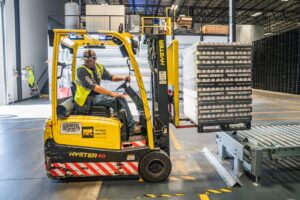Wholesale Channel
While we are probably most familiar with the retail channel, wholesalers play an important role as intermediaries. Intermediaries act as a link in the distribution process, but the roles they fill are broader than simply connecting the different channel partners. Wholesalers, often called “merchant wholesalers,” help move goods between producers and retailers.
Let’s look at each of the functions that a merchant wholesaler fulfills.
Purchasing
Wholesalers purchase very large quantities of goods directly from producers or from other wholesalers. By purchasing large quantities or volumes, wholesalers are able to secure significantly lower prices.
Imagine a situation in which a farmer grows a very large crop of potatoes. If he sells all of the potatoes to a single wholesaler, he will negotiate one price and make one sale. Because this is an efficient process that allows him to focus on farming (rather than searching for additional buyers), he will likely be willing to negotiate a lower price. Even more important, because the wholesaler has such strong buying power, the wholesaler is able to force a lower price on every farmer who is selling potatoes.
The same is true for almost all mass-produced goods. When a producer creates a large quantity of goods, it is most efficient to sell all of them to one wholesaler, rather than negotiating prices and making sales with many retailers or an even larger number of consumers. Also, the bigger the wholesaler is, the more likely it will have significant power to set attractive prices.
Warehousing and Transportation

Once the wholesaler has purchased a mass quantity of goods, it needs to get them to a place where they can be purchased by consumers. This is a complex and expensive process. McLane Grocery, one of the largest supply chain services leaders in the United States, operates 24 distribution centers around the country with a trucking fleet of over 1,600 tractors and 2,700 multi-temperature trailers to handle the transportation of product.[1]
Grading and Packaging
Wholesalers buy a very large quantity of goods that they then break down into smaller lots. The process of breaking large quantities into smaller lots to be resold is called bulk breaking. Often this includes physically sorting, grading, and assembling the goods. Returning to our potato example, the wholesaler would determine which potatoes are of a size and quality to sell individually and which are to be packaged for sale in five-pound bags.
Risk Bearing
Wholesalers own the goods they purchase. There are two primary consequences of this, both of which are both very important to the distribution channel. First, it means that the wholesaler finances the purchase of the goods and carries the cost of the goods in inventory until they are sold. Because this is a tremendous expense, it drives wholesalers to be accurate and efficient in their purchasing, warehousing, and transportation processes.
Second, wholesalers also bear the risk for the products until they are delivered. If goods are damaged in transport and cannot be sold, then the wholesaler is left with the spoiled goods and the cost. If there is a significant change in the value of the products between the time of the purchase from the producer and the sale to the retailer, the wholesaler will absorb that profit or loss.
Marketing
Often, the wholesaler will fill a role in the promotion of the products that it distributes. This might include creating displays for the wholesaler’s products and providing the display to retailers to increase sales. The wholesaler may advertise its products that are carried by many retailers. Wholesalers also influence which products the retailer offers.
Distribution
As distribution channels have evolved, some retailers, such as Walmart and Target, have grown so large that they have taken over aspects of the wholesale function. Still, it is unlikely that wholesalers will ever go away. Most retailers rely on wholesalers to fulfill the functions that we have discussed, and they simply do not have the capability or expertise to manage the full distribution process. Plus, many of the functions that wholesalers provide are performed most efficiently at scale. Wholesalers are able to focus on creating efficiencies for their retail channel partners that are very difficult to replicate on a small scale.
- McLane Company. "Logistics." Grocery Supply Chain Solutions. Accessed February 7, 2022. https://www.mclaneco.com/content/mclaneco/en/solutions.html#grocery ↵